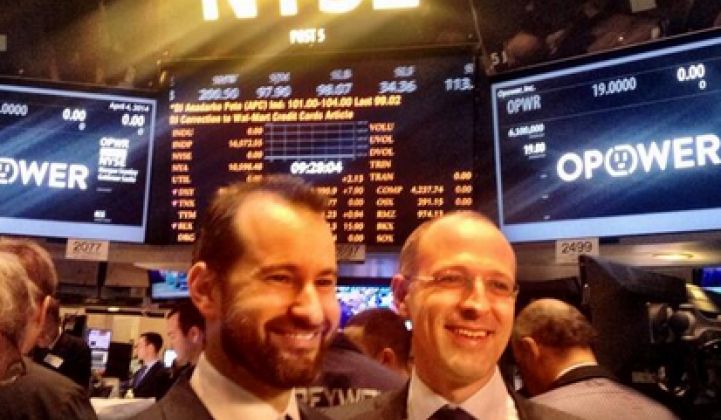The first quarter of this year brought the most public offerings in fourteen years. And today, as Opower starts trading on the New York Stock Exchange and becomes "OPWR," cleantech investors will get a piece of that record activity.
As of 9:53 a.m., OPWR stock was up 27 percent at just over $24. In preparation for its public launch, Opower set its share price at $19 last night.
Roderick Morris, the senior vice president of marketing at Opower, tweeted out a picture of the company's smiling co-founders as the market opened this morning:
Big day for Opower #OPWR pic.twitter.com/ZWpkNnuhIc
— Roderick Morris (@roderickmorris) April 4, 2014Co-founders Alex Laskey and Dan Yates collectively own 40 percent of Opower, putting them in a strong position going into the IPO. They were able to keep a large piece of the company because Opower was performing so well going into later venture rounds.
"This is what you can get out of the cleanweb," said investor Jigar Shah, talking about Opower in a recent Energy Gang podcast. "In general, the founder ends up with 5 percent to 7 percent of the company after all the successive rounds, so I think that for these guys to have so much of the company shows the power of their execution, but also the power of the cleanweb."
Opower is exactly why early-stage investors have become attracted to the cleanweb. The company requires no heavy infrastructure to keep growing its service -- just a strong marketing team, the ability to capture meaningful data, and a big enough vision to outpace other software competitors.
Opower is a much different company than it was when it started seven years ago. And, assuming it can keep sales high and investors happy, it has the ability to attack other markets without burdensome capital requirements.
However, Opower's IPO isn't just about the attraction to cleanweb. It's also about growth in a subsector of the cleanweb: intelligent efficiency.
A year ago, Greentech Media released a report on the state of the intelligent efficiency sector. The report provided some clarity on how the convergence of IT and efficiency is driving company strategies. Of course, we weren't outlining a fundamentally new concept. People have understood for a long time how powerful IT could be in driving efficiency in buildings, homes, transportation fleets and the power sector. But we're now starting to see market validation as startups become more targeted in their approach, attract more venture dollars and raise bigger funds for efficiency projects.
In last year's Global Cleantech 100 report, which is based on a ranking system created by investors that provides a guide of where money is going, IT-based efficiency companies made up a quarter of the list. Five years before, upstream solar companies dominated the list.
"We've seen a huge push up in energy efficiency," said Cleantech Group CEO Sheeraz Haji. "That's really illustrative of the broader shift away from capital-intensive upstream solar and toward cleanweb, capital-efficient, software-type deals."
Opower is also validation for other software startups working on efficiency solutions that investors appear willing to support.
"Opower has excited the market by going where no data analytics company has gone before: not just cracking the utility market, but taking it by storm," said Abhay Gupta, CEO of Bidgely, a company that wants to compete with Opower by deploying pattern recognition software in the home.
"The industry is just getting started translating big data into meaningful energy applications," said Gupta.
The public debut of a major software-based intelligent efficiency company is a good sign for the sector. But there are hundreds of other providers trying to get into homes and businesses with similar products, which could be confusing for customers. Simply chasing Opower won't be enough for competitors. And investors are going to be skimming through a lot of froth.
For today, however, most are ready to celebrate another public exit for a cleantech leader after a tough few years for investors.
"I think everybody who has invested their own sweat and tears in cleantech is rooting for Opower -- collaborators and competitors alike," said Abe Yokell, a partner with RockPort Capital.



